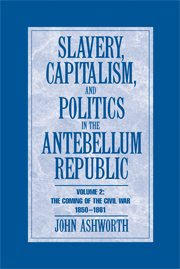Introduction: Explaining the Civil War (1)
Published online by Cambridge University Press: 05 June 2012
Summary
The slaveholders of the South thought they knew their slaves. They were certain that they understood the capabilities and the limitations of their “negroes.” They believed that, in the main, enslavement suited African Americans and accorded well with their natural endowments, or the lack of them. Historians used to believe the same. Ulrich B. Phillips, for example, referred to the slaves' “courteous acceptance of subordination” and their “readiness for loyalty of a feudal sort.” American slaves were well-suited to their condition.
Yet, Phillips and the slaveholders of the Old South erred grievously. Historians now know what contemporaries and most scholars of previous generations did not: in most cases, slaves did not want to be slaves and instead yearned for freedom. Although this insight has emerged from the social history of African Americans before the Civil War, it has only recently made an appearance in the historiography of the Civil War itself. In fact, the opposition of the slaves to their own enslavement is the fundamental, irreplaceable cause of the War.
This is not to say, of course, that the slaves were able actively to plan or to seek, or to bring about a civil war between North and South. A war could only come about as a result of a whole series of actions taken within the political arena by those who were legally able to take them. Slaves were not, in this sense, political actors at all.
- Type
- Chapter
- Information
- Publisher: Cambridge University PressPrint publication year: 2007



